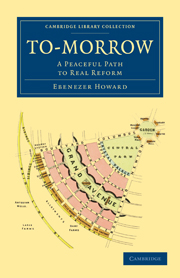Book contents
- Frontmatter
- Contents
- LIST OF ILLUSTRATIONS
- Introduction
- Chap. I The Town-Country Magnet
- Chap. II The Revenue of Garden City, and how it is obtained—The Agricultural Estate
- Chap. III The Revenue of Garden City—Town Estate
- Chap. IV The Revenue of Garden City—General Observations on its Expenditure
- Chap. V Further Details of Expenditure on Garden City
- Chap. VI Administration
- Chap. VII Semi-Municipal Enterprise—Local Option—Temperance Reform
- Chap. VIII Pro-Municipal Work
- Chap. IX Administration—A Bird's Eye View
- Chap. X Some Difficulties Considered
- Chap. XI A Unique Combination of Proposals
- Chap. XII The Path followed up
- Chap. XIII Social Cities
- Chap. XIV The Future of London
- APPENDIX: Water-Supply
- INDEX
- Plate section
APPENDIX: Water-Supply
Published online by Cambridge University Press: 05 February 2012
- Frontmatter
- Contents
- LIST OF ILLUSTRATIONS
- Introduction
- Chap. I The Town-Country Magnet
- Chap. II The Revenue of Garden City, and how it is obtained—The Agricultural Estate
- Chap. III The Revenue of Garden City—Town Estate
- Chap. IV The Revenue of Garden City—General Observations on its Expenditure
- Chap. V Further Details of Expenditure on Garden City
- Chap. VI Administration
- Chap. VII Semi-Municipal Enterprise—Local Option—Temperance Reform
- Chap. VIII Pro-Municipal Work
- Chap. IX Administration—A Bird's Eye View
- Chap. X Some Difficulties Considered
- Chap. XI A Unique Combination of Proposals
- Chap. XII The Path followed up
- Chap. XIII Social Cities
- Chap. XIV The Future of London
- APPENDIX: Water-Supply
- INDEX
- Plate section
Summary
“Beauty must come back to the useful arts, and the distinction between the fine and the useful arts be forgotten. If history were truly told, if life were nobly spent, it would be no longer easy or possible to distinguish the one from the other. In nature, all is useful, all is beautiful. It is therefore beautiful, because it is alive, moving, reproductive; it is therefore useful, because it is symmetrical and fair. Beauty will not come at the call of a legislature, nor will it repeat in England or America its history in Greece. It will come, as always, unannounced, and spring up between the feet of brave and earnest men. It is in vain that we look for genius to reiterate its miracles in the old arts; it is its instinct to find beauty and holiness in new and necessary facts, in the field and roadside, in the shop and mill.
“Is not the selfish and even cruel aspect which belongs to our great mechanical works—to mills, railways and machinery—the effect of the mercenary impulses which these works obey?
“When science is learned in love, and its powers are wielded by love, they will appear the supplements and continuations of the material creation.”
—R. W. Emerson. “Essay on Art.”The bounty of Nature and the selfish improvidence of man—so finely dealt with in the above essay—are perhaps in no way more clearly seen than in the marvellous contrast between the abundant water-supply presented as a free gift for the service of man, aud the pitiful and paltry use he makes of it.
- Type
- Chapter
- Information
- To-morrowA Peaceful Path to Real Reform, pp. 153 - 168Publisher: Cambridge University PressPrint publication year: 2010First published in: 1898



